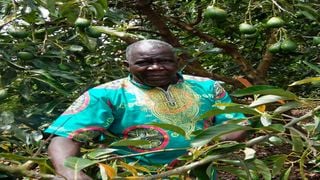
Mr Gideon Gitonga at his avocado farm in Kirwire village, Meru County.
| Caroline Wambui | Nation Media GroupMeru
Premium
Avocado theft gangs target Meru farms
What you need to know:
- Thieves are sent to steal the fruits by brokers, leaving farmers counting losses.
- The demand for avocados in the international market has been on the rise.
Avocado farmer Gitobu Nkanata was certain he could earn about Sh20,000 by the end of this month from his 33 mature trees.
But this was not to be, as organised gangs that are slowly penetrating the lucrative avocado trade in the region stole more than 800 fruits from his farm in Abogeta West, Meru County, two weeks ago.
In the last few years, prices for the Hass variety of avocado have more than doubled to Sh15 a piece at the farm gate, while exporters sell each fruit for up to Sh30, drawing a host of brokers to the trade.
The demand for avocados in the international market has been on the rise, with Kenya earning more than Sh4.26 billion in exports between January and March this year and Sh14 billion last year.
In what is now seen as organised crime akin to the avocado theft gangs of South Africa and the avocado cartels of Mexico, farmers are calling for urgent intervention to avert a conflict.
Avocado theft in South Africa, media reports show, is coordinated by organised gangs while in Mexico, drug cartels are fighting to take control of the avocado trade.
A report by the South African Subtropical Growers Association indicated that farmers in that country lose up to Sh183 million to theft every year.
In Mexico, growers and buyers have resorted to recruiting private security forces to fend off the cartel militia targeting the trade valued at close to Sh260 billion.
Unscrupulous brokers
Mr Nkanata is among hundreds of farmers who have been laughing all the way to the bank from the booming avocado business, but the emerging trend of organised theft is threatening the ‘green gold’.
“The thieves are well organised because they come armed with spotlights and vehicles to cart away the loot. They are coordinated by unscrupulous brokers who are sent by exporters based in Nairobi. The thieves are organised because they know how to select mature fruits,” Mr Nkanata said.
He is among more than 10 farmers in Abogeta West who have lost their fruits to thieves in the last one month.
“We need to discuss policies where we eliminate all brokers and other unscrupulous suspects posing as buyers. We need a joint meeting with security agents to streamline this industry. We need to be firm, swift and serious with avocado thieves to stop this menace,” he said.
Abogeta West Avocado Cooperative Society chairman Kinyua Mburugu said about 12 farmers have lost their fruits to thieves in the last one month.
Thieves have been invading farms in the dead of night and harvesting fruits for sale to middlemen, he said.
“Farmers are now concerned because the theft that started two years ago has now become rampant. We have reported to the chief and police and hope the vice will end. We urge residents and farmers to share intelligence to help in arresting the suspects,” he said.
The young people who are sent out to steal the fruits are said to get up to Sh3 per piece, leaving farmers at the risk of losing all fruits.
“One of our members lost his entire fruits to the thieves last week showing how zealous the theft gangs are. Good practice requires that buyers visit and buy fruits directly from the orchards to ensure traceability and quality,” he said.
Hiring vigilantes
He said it is illegal for anyone to buy avocado whose source is unknown, as it also affects the quality of the produce.
“We have intelligence that most of the thieves are local youth who are being used by brokers to access avocado at throwaway prices. Our cooperative has entered a contract with a buyer for Sh15 per fruit, and any broker must exceed that price to buy from our farmers. To bypass this, they have resorted to stealing,” he lamented.
He said policy and legislative measures are needed to address the vice that is likely to get out of hand to parallel the organised criminal gangs of South America and South Africa.
Besides relying on the police, farmers in Abogeta West are now pondering hiring vigilantes to stop the theft threatening their source of income.
Farmers are also recommending that brokers be barred from operating on roadsides and get approval from authorities before buying the fruits.
“We already have a security community-based organisation that we now intend to use to track down the gangs. We are not taking this trend lying down,” Mr Nkanata said.
The Abogeta West Avocado Cooperative Society, through support from the National Agricultural and Rural Inclusive Growth (Narig) Project, is also creating employment for idle youth to reduce cases of theft, Mr Mburugu said.
“Once we enter a contract with the buyer, we ensure that the local youth are engaged in harvesting where they earn Sh1 per fruit,” he said.
Avocado theft is a problem in other parts of the region. Farmers in Murang’a County have in the past complained about rampant theft that is also said to be fuelled by brokers.





